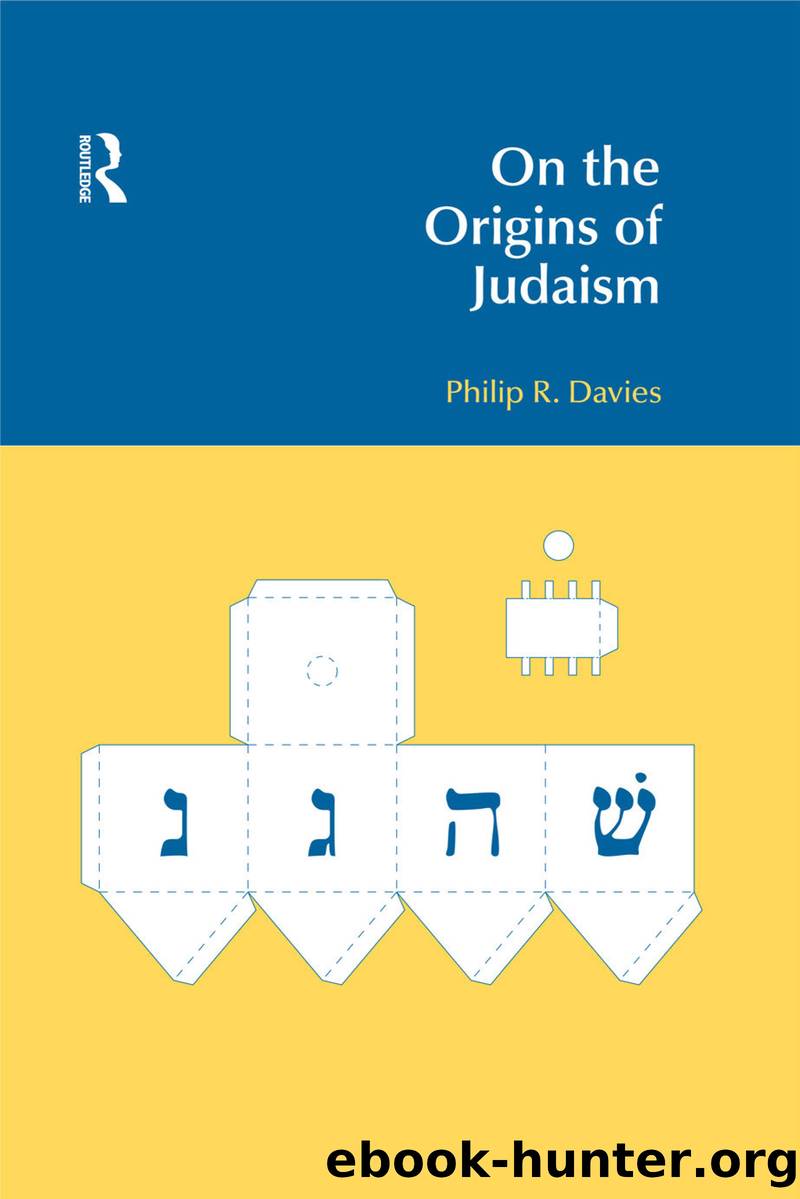On the Origins of Judaism by Philip R. Davies;

Author:Philip R. Davies; [Davies, Philip R.]
Language: eng
Format: epub, pdf
ISBN: 9781134945092
Publisher: Taylor & Francis (Unlimited)
Published: 2022-05-20T00:00:00+00:00
6 the god of cyrus and the god of israel
DOI: 10.4324/9781315539270-8
âSecond Isaiahâ or âDeutero-Isaiahâ (Isaiah 40â55) has, like Deuteronomy, secured a virtual scholarly unanimity over its time and place of composition. This chapter is a contribution to recent efforts at dislodging this poetry, also, from its assigned place, and so to revise some notions about the history of the cult of Yhwh and the origins of âearly Judaism.â
I begin with the explicit historical references in Isaiah 40â55, namely the mention of Cyrus in 44:28 and 45:1â7. The relationship between these passages and the famous inscription of the Persian king now housed in the British Museum (for the text see, e.g., Oppenheim in Pritchard, 1969: 315â16; Fish in Winton Thomas, 1958: 92) has been invoked and examined many times. According to the Cyrus Inscription the âlord of the godsâ (Marduk), also âprotector of his people,â searched for a ârighteous ruler to take his handâ and pronounced the name of Cyrus as future ruler of the world. Marduk âbeheld Cyrus's good deeds and upright heart,â as a result of which Babylon was overcome without any battle, and subsequently âall the kings of the world brought tributesâ to Cyrus, while the new ruler of the world rebuilt cities and sanctuaries. Similarly, in Isaiah 45 Yhwh âgrasps Cyrus's hand,â to empower him to âsubdue nationsâ and âopen gatesâ; as a result, the wealth of Egypt and the Sabaeans will come to Cyrus.
These parallels, first noted almost a century ago (see Kittel, 1898) continue to be noted, but almost inevitably with the demurrer that the writer of the Hebrew poems cannot have been dependent on the inscription; they must have been written before Cyrus's capture of Babylon. This assertion carries the implication that the poetry is a genuine prediction, though only by a short period. At all events, the similarities between the texts tend for the most part to be regarded as each dependent on either a âBabylonian court styleâ (Gressmann, 1929: 59â60) or, with greater form-critical precision, the genre of âroyal oracleâ (Westermann, 1969: 154). Morton Smith (1963) proposed a more precise definition of the relationship, arguing that the parallels between the biblical texts and the inscription all involve only the first part of the inscription, which speaks of the king in the third person, and which, on Smith's view, represents propaganda from the Babylonian priesthood, originating from before Cyrus's arrival in Babylon, and paralleled only in Isaiah 40â48, whereas to the second part of the inscription there are âalmost no parallels in II Isaiahâ (415).
Smith's verdict is that âthe parallels demonstrate literary dependenceâ (417). However, since the statements of Second Isaiah about the capture of Babylon are inaccurate, they must, he concludes, have been written before the peaceful capture of that city. The lack of parallels with the second part of the inscription, which tells of the favourable treatment of Babylon by its new ruler, are claimed to support this contention. Thus, the sentiments of the author of the Hebrew text are the result of successful Persian propaganda.
Download
On the Origins of Judaism by Philip R. Davies;.pdf
This site does not store any files on its server. We only index and link to content provided by other sites. Please contact the content providers to delete copyright contents if any and email us, we'll remove relevant links or contents immediately.
| Central Africa | East Africa |
| North Africa | Southern Africa |
| West Africa | Algeria |
| Egypt | Ethiopia |
| Kenya | Nigeria |
| South Africa | Sudan |
| Zimbabwe |
Goodbye Paradise(3799)
Men at Arms by Terry Pratchett(2832)
Tobruk by Peter Fitzsimons(2508)
Borders by unknow(2303)
Arabs by Eugene Rogan(2292)
Pirate Alley by Terry McKnight(2218)
More Than Words (Sweet Lady Kisses) by Helen West(1860)
Belonging by Unknown(1854)
It's Our Turn to Eat by Michela Wrong(1727)
The Biafra Story by Frederick Forsyth(1653)
The Source by James A. Michener(1603)
Botswana--Culture Smart! by Michael Main(1598)
Coffee: From Bean to Barista by Robert W. Thurston(1542)
A Winter in Arabia by Freya Stark(1534)
Gandhi by Ramachandra Guha(1528)
The Falls by Unknown(1520)
Livingstone by Tim Jeal(1482)
The Shield and The Sword by Ernle Bradford(1402)
Africa: Altered States, Ordinary Miracles by Richard Dowden(1382)
